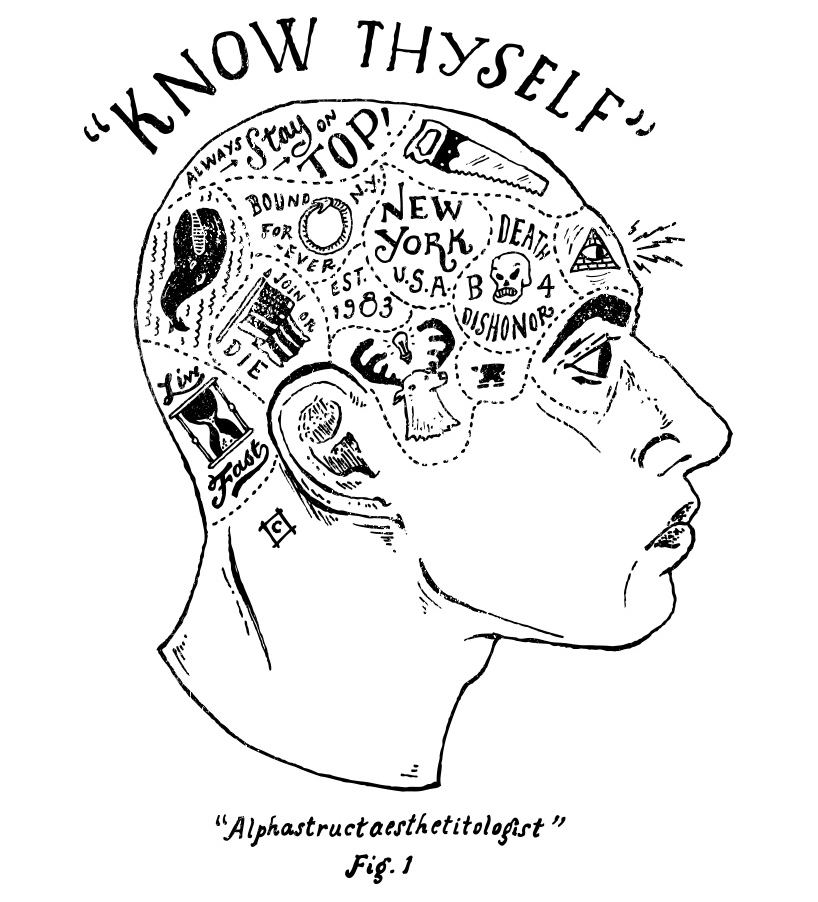“Know thyself,” two words constructing a meaning that can transcend all aspects of our life. I found these words to be so profound at twenty years of age that I decided to have them permanently inked onto my body, not knowing at the time they could have a deeper meaning for me in the realm of leadership. The idea of knowing oneself is briefly touched upon in the trait theory but through the idea of personal intelligence there is offered an interesting connection to leadership, within the confines of the trait theory. I found this connection as I was sifting through the most recent issue of Psychology Today stumbling upon an article posing the question “what does it mean to possess personal intelligence?” (Mayer, 2014, p. 66) I was intrigued, wondering if the philosophical tattoo wrapped around my wrist and the meaning I derived from it could provide an advantage for me in the business world.
We know from the lesson, the trait approach encompasses many ideas spanning from having innate traits to social intelligence that make an effective leader. The five key traits mentioned to be an effective leader are intelligence, self-confidence, determination, integrity, and sociability (Nothouse, 2013, loc.791). On the other side of the coin, is social intelligence which is the idea of one’s ability to to understand their feelings, thoughts, and behaviors, as well as, those of others (Northouse, 2013, loc.776). This idea is elaborated on with the concept of personal intelligence. According to Mayer, personal intelligence is the ability to understand yourself, giving way to the ability to better understand those around you (Mayer, 2014, p. 66)
Mayer formed this theory by doing vast amounts of research reading through biographies to find examples of people who appeared to excel in personal intelligence (Mayer, 2014, p.66). Examples given were those of Katharine Graham taking over The Washington Post after her husband’s death, JKF’s study of Khrushchev’s personality, and journalist David Carr’s journey writing his memoir. Each of these biographies showed different aspects of personal intelligence such as knowing your limitations, being able to modify opinions held of others, learning from interactions with others, and the ability to recognize past flaws without holding onto regret. As Mayer described, personal intelligence allows us to see ourselves and others with fidelity by recognizing we are all fallible (Mayer, 2014, p. 71).
So does this idea of personal intelligence, or “knowing thyself”, create a better leader? In looking at the example of Katharine Graham, it could be said yes. Graham took what she knew about herself, from openly admitting her limitations to embracing she was a different leader than her husband, to successfully manage the newspaper she inherited (Mayer, 2014, p. 66). Obviously, more research needs to be considered to see the implications of personal intelligence on leadership, however, I find it an interesting idea to consider. As for helping me to be a better leader, I think it’s important to understand yourself to provide self-confidence and a clear mind.
Mayer, J. (2014, March 11). Know thyself. Psychology Today, 65-71. Retrieved from http://www.psychologytoday.com/articles/201402/know-thyself
Northouse, P.G. (2013). Leadership: Theory and Practice. Los Angeles: Sage Publications. Kindle Edition.
https://www.google.com/search?hl=en&authuser=0&site=imghp&tbm=isch&source=hp&biw=1276&bih=670&q=know+thyself&oq=know+thy&gs_l=img.3.0.0l10.1449.3042.0.5034.8.8.0.0.0.0.219.916.2j5j1.8.0….0…1ac.1.38.img..2.6.640.SDzzJnPWT5Q#facrc=_&imgdii=_&imgrc=qrMIXv7IOxdmMM%253A%3B14_cg0Sahv_IaM%3Bhttp%253A%252F%252Fwww.designboom.com%252Fweblog%252Fimages%252Fimages_2%252Fandy%252Fjon_contino%252Fjon_contino_01.jpg%3Bhttp%253A%252F%252Fwww.designboom.com%252Fdesign%252Fjon-contino-interview%252F%3B818%3B902


“The trait approach has failed to take situations into account”. (Northouse, 2013) Your view seems to be that the situations have been taken into account. After all, isn’t that the core point in personal or emotional intelligence?
Daniel Goleman, psychologist and author of Focus: The Hidden Driver of Excellence was recently quoted in The Huffington Post. “What having emotional intelligence looks like is that you’re confident, good at working towards your goals, adaptable and flexible. You recover quickly from stress and you’re resilient. That sounds like personal intelligence to me too!
Regardless of personal, emotional intelligent or the trait theory, I completely agree that it is important to understand yourself in order to be self-confident and have a clear mind.
Read the full article at the Huffington Post http://www.huffingtonpost.com/2013/12/05/are-you-emotionally-intel_n_4371920.html